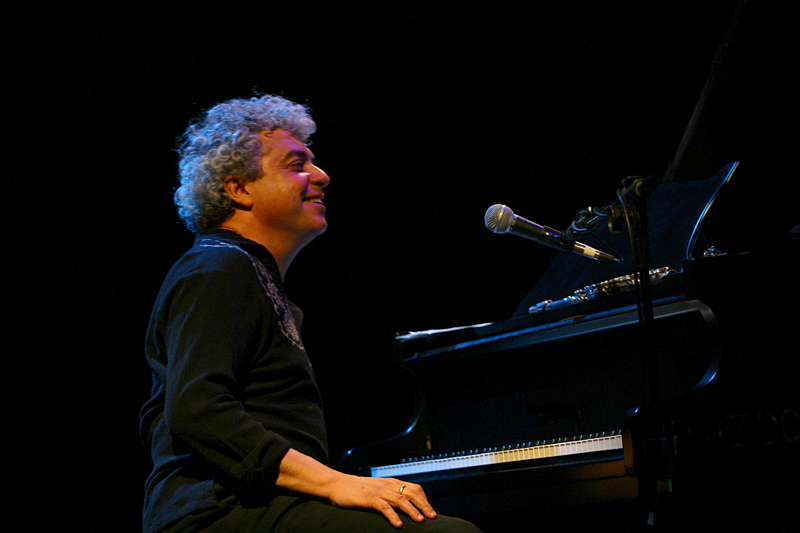Jovino Santos Neto not only has a fantastic name, but a gorgeous accent that could make the most mundane remark on the weather sound like a seductive compliment. The Brazilian musician is seated behind a piano playing jazz with his friends at Vito’s on a Friday night. As they fill the space with bombastic melodies and improvisation, his contrasting dark eyebrows rise and fall expressively. He’s captivating to watch, but most of the patrons seem unaware that they are in the presence of a man who has been nominated not once, but thrice, for a Latin Grammy. The restaurant portion of the Italian-inspired hangout is packed with groups of people enjoying conversation and laughter over large plates of spaghetti and meatballs, while the lounge is filled with even louder patrons, some of who’ve perhaps had a few drinks too many. Santos Neto is fine with all of that.
“There’s a lot going on,” he acknowledges about performing in a lounge atmosphere. “But when you’re playing in a place full of people eating, drinking, and talking, that’s when music becomes like a fireplace. They are attracted to its warmth. They may be talking, but they can still feel it.”
Santos Neto developed his passion early in life just outside Rio de Janeiro. He attributes his appreciation for music to his home country, citing a diverse scene influenced by the sounds of Europe, the Middle East, and Africa. He started taking piano lessons at age 13, but within six months abandoned them in favor of studying independently. By 16, his keyboard skills were earning him paid gigs, and he spent much of his 20s in a group led by renowned Brazilian composer Hermeto Pascoal. But interestingly, Santos Neto studied not music but biology during his years at the Federal University of Rio de Janeiro and Macdonald College at McGill University in Montreal before relocating to Seattle in 1993 to study composition at Cornish College of the Arts.
“I view music from the same perspective that I view biology,” he says, laughing, in his studio on Capitol Hill, brushing off the seemingly unlikely combination of interests. “Both are forces of nature. They can be played with, but they can never fully be controlled.”
Yet Santos Neto, arguably, has learned to handle music with a firm hand. All his work—he arranges, composes, produces, and plays both the piano and flute—is filled, deftly, with multicultural influences. His resume boasts Latin Grammy nominations for Best Jazz Album in 2004 and 2006, as well as a 2009 nomination for Best Instrumental Album. And while some musicians would become jaded after racking up such accomplishments, Santos Neto remains as enthusiastic as ever.
“There are very few performers who are able to convey their love of music the way that Jovino does,” Vito’s owner, Greg Lundgren, says. “His joy is infectious—you can’t help but smile when you realize what a great time he has playing.”
Today, at age 57, almost two decades after moving to Seattle, Santos Neto teaches a variety of courses at Cornish, including composition, Brazilian rhythm, and Latin ensemble. Some evenings, Santos Neto can be found performing live with his former students, as at his monthly gig at Vito’s.
“Music is one of the only cross- generational endeavors,” he explains. “In fields like science and sports, you can’t put a younger person with a more experienced person and expect optimal results. But music opens equal possibilities to everyone. A younger person can learn from someone like me, but they also help keep me on my toes.”
But given the spark in Santos Neto’s playing, it’s hard to say who’s really keeping whom on their toes.





